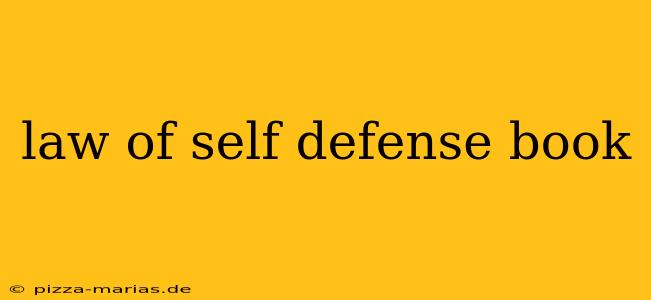The right to self-defense is a fundamental aspect of personal safety and legal systems worldwide. However, the specifics of self-defense law can be complex and vary significantly by jurisdiction. This article will delve into key aspects of self-defense law, examining common misconceptions and providing a foundational understanding. This is not legal advice; always consult a legal professional for specific guidance in your situation.
What Constitutes Self-Defense?
Self-defense laws generally allow the use of force to protect oneself or another person from imminent unlawful harm. The key elements usually include:
- Imminent Threat: The danger must be immediate and unavoidable. A potential future threat doesn't justify self-defense.
- Unlawful Harm: The threat must be illegal. You can't use self-defense against someone acting lawfully, even if you feel threatened.
- Proportionality: The force used in self-defense must be proportional to the threat. Using excessive force can lead to criminal charges. A minor threat generally doesn't justify deadly force.
- Reasonable Belief: You must reasonably believe that the use of force is necessary to prevent imminent unlawful harm. This is a subjective assessment, considering the circumstances and your perspective.
Understanding the "Stand Your Ground" Laws
Many jurisdictions have "stand your ground" laws. These laws generally eliminate the duty to retreat before using force in self-defense, even if it's possible to safely do so. However, the requirement of a reasonable belief in imminent harm and proportionality of force still applies. These laws vary significantly in their specifics, so it's crucial to understand the nuances of your state's or country's legislation.
What About the Duty to Retreat?
In jurisdictions without "stand your ground" laws, a duty to retreat may exist. This means you're legally obligated to retreat if it's safe to do so before resorting to self-defense. Failure to retreat, even if you reasonably believe you are in danger, can impact your self-defense claim.
Common Misconceptions About Self-Defense
Several common misconceptions surround self-defense law:
- "I have to wait until I'm actually attacked before I can defend myself." This is false. Self-defense can be justified if you have a reasonable belief that an imminent attack is about to occur.
- "If I use a weapon in self-defense, I will automatically be prosecuted." This is not always true. The use of a weapon in self-defense can be justified if it's proportional to the threat and you reasonably believe it's necessary.
- "Self-defense only applies to physical attacks." This is incorrect. Self-defense can also apply to certain types of verbal threats or other forms of harassment if they pose an imminent threat of physical harm.
How to Choose the Right Self-Defense Book
Choosing a suitable book on self-defense law requires careful consideration. Look for books that:
- Are specific to your jurisdiction: Self-defense laws vary drastically. A book covering general principles may not be applicable to your location.
- Are written by legal professionals: Ensure the author has relevant legal expertise.
- Are up-to-date: Laws change. Choose a recent publication to ensure the information is current.
- Clearly explain complex legal concepts: A well-written book will make complex legal concepts easily understandable for a non-legal audience.
- Provide real-life examples: Case studies can help illustrate the application of self-defense laws.
Resources for Further Research
For in-depth information about self-defense laws in your area, consult:
- Your local bar association: They can provide referrals to legal professionals specializing in self-defense cases.
- Legal textbooks and journals: These offer detailed analysis of self-defense law.
- Government websites: Your state or country's government website should have information on relevant statutes and case law.
Remember: This information is for educational purposes only and does not constitute legal advice. Always seek the counsel of a qualified legal professional for specific guidance related to self-defense law. Understanding your rights is crucial, but acting without professional legal advice could have serious consequences.
